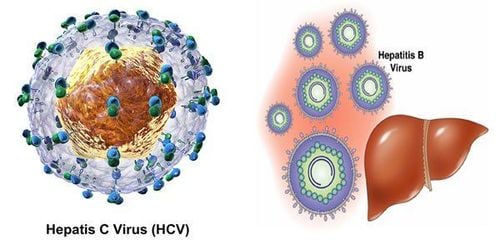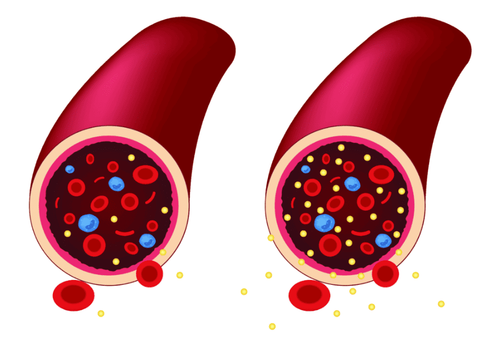This is an automatically translated article.
The article was professionally consulted by Master, Doctor Nguyen Thi Nhat - Infectious Disease Specialist - Department of Medical Examination & Internal Medicine - Vinmec Hai Phong International General HospitalAfter entering the body, the incubation period of hepatitis C virus is quite long (from 2 weeks to 6 months). However, anti-HCV tests during this time still give negative results because the body has not had time to create antibodies against the virus.
1. What is Hepatitis C?
Hepatitis C is an infectious liver disease caused by the Hepatitis C virus (HCV). This is one of the five main types of hepatitis: A, B, D, E.The disease is transmitted from a carrier of the hepatitis C virus to a healthy person by 3 routes: blood, sex, and mother-to-child transmission. placenta at birth.
However, the risk of sexually transmitted infection of Hepatitis C is rarer than that of hepatitis B. The phenomenon of mother transmitting hepatitis C virus to her child has been recorded but the rate is also low. Thus, the risk of hepatitis C virus infection is mainly through blood (recipients of blood or blood products infected with virus C; sharing needles contaminated with virus C; a number of other causes such as acupuncture, ear piercing. , tattoo but the practice tools are not absolutely sterile...).
In addition, there is an incidence of about 30-40% of cases with HCV infection but the cause of infection is unknown.
Hepatitis C can be treated with antiviral drugs because there is currently no vaccine to prevent hepatitis C.

2. Hepatitis C . Stages
Hepatitis C is divided into two stages: acute hepatitis C and chronic hepatitis C.Acute hepatitis C : is a viral infection that develops in the first weeks or months after the hepatitis C virus enters a person's bloodstream. "Acute" means sudden and brief illness, occurring within the first two weeks to six months.
In 25% of cases, the virus clears itself from the body without treatment. Without obvious signs of illness, most acute hepatitis C cases lead to chronic infection.
Chronic Hepatitis C: An estimated 75% to 85% of people with acute hepatitis C will develop a chronic infection, lasting at least 6 months and often longer. Even at this stage, most people have no symptoms, but that doesn't mean the infection is benign.
Each year, about 150 million people are chronically infected with the hepatitis C virus and are at risk of developing cirrhosis, liver cancer or liver failure leading to death
3. What is the incubation period for hepatitis C?
After HCV enters the body, they have a rather long incubation period, from 2 weeks to 6 months, depending on the condition of each patient.After initial infection, about 80% of people do not show any symptoms and anti-HCV tests are still negative for the virus because the body has not had time to make antibodies against HCV. virus again.
4. Symptoms of Hepatitis C

Symptoms of acute hepatitis C People with acute hepatitis C usually do not have any symptoms (symptoms). However, some people will have mild to severe symptoms after being infected with the virus, including:
Fatigue, loss of appetite: This is a fairly common sign in people with acute hepatitis C. Infected people have this symptom because the hepatitis C virus directly attacks the immune system, thereby making the patient tired, lazy, afraid to move even when lying down.
Mild fever : This is one of the manifestations of hepatitis C, this fever symptom can last long or occur in episodes. Usually, patients are quite ignorant when they have this sign because they think it's just the weather or a common cold.
Yellow skin, itching or yellow eyes : In the early stages, this symptom rarely appears. The cause of this symptom is the hepatitis C virus, which slows down the functioning of the liver, affecting its ability to filter out harmful toxins from the body, thereby causing high levels of bilirubin in the blood. Therefore, it will cause yellowing of the eyes and skin in patients.
In addition to the above symptoms, the patient may also have some other hepatitis C symptoms, such as: Muscle aches; Pain in the upper right part of the abdomen; Muscle or joint pain; Nausea or Vomiting; Stomach pain, weight loss; Dark yellow urine, pale stools; Easy bleeding, easy bruising.
Symptoms of Chronic Hepatitis C Most patients with chronic hepatitis C have no symptoms. People who have been infected with the hepatitis C virus for many years can damage the liver. In many cases, there are no symptoms until complications develop.
In asymptomatic patients, hepatitis C is often detected by blood liver enzyme tests (ALT, AST) that are found to be elevated, and up to a quarter of people with chronic hepatitis C continue to have symptoms. cirrhosis, or severe scarring of the liver. These people may also have other symptoms including swelling in the legs and abdomen, and a build-up of toxins in the blood that can lead to brain damage.
However, the symptoms of hepatitis C in each patient are different. There are people who have the disease but do not have any symptoms or symptoms are very faint, not enough to recognize. In fact, many people have the disease for years without even knowing it.
To find out if you have hepatitis C or not, you need to have a blood test to make a diagnosis. Therefore, experts recommend to be screened for hepatitis C at least once every 6 months, if unfortunately, you should absolutely follow the instructions of your treating doctor.
Please dial HOTLINE for more information or register for an appointment HERE. Download MyVinmec app to make appointments faster and to manage your bookings easily.














